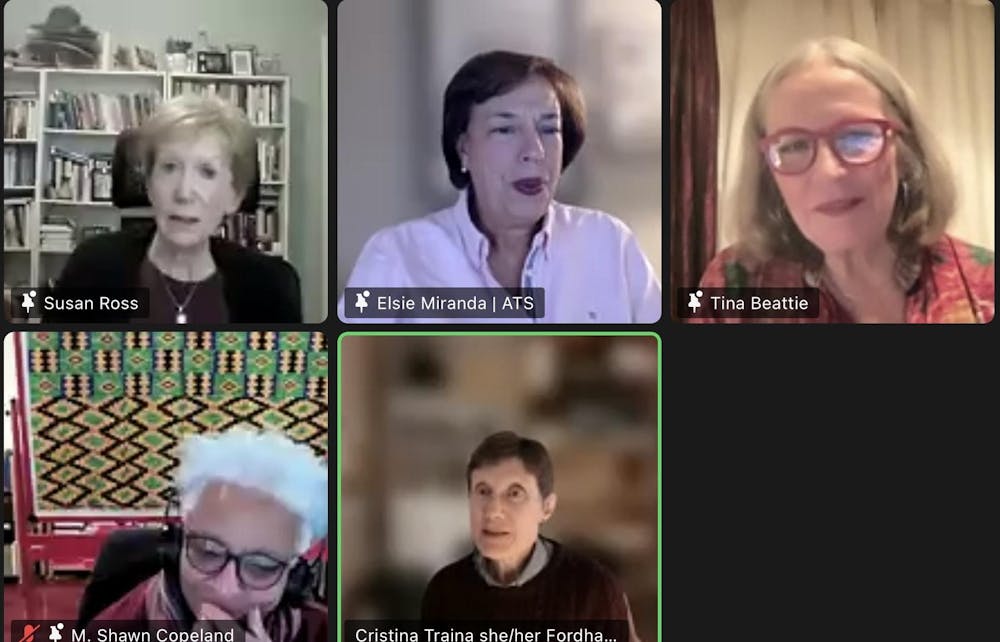On Oct. 10 at 7 p.m., the Center for the Study of Spirituality at Saint Mary’s College held the final webinar, “What it Means to be Human: Synodal Considerations on Technological Anthropologies,” to cap off the three-part series conducted by several authors of the coinciding, to be published, essayist novel.
Of the series' parts, this webinar was the first to have an all-female cast of theologians at the helm of discussion: Elsie Miranda, Tina Beattie, M. Shawn Copeland and Susan Ross. During the webinar, the cast read prepared sections and summaries of their essays and later opened up to free dialogue during the Q&A finale of the webinar. The discussions specifically focused on women, minorities and LGBTQ+ persons finding place in the anthropology of the Roman Catholic Church.
The webinar opened with a prayer said by Miranda, director of diversity and inclusion at the Association of Theological Schools. She prayed to open the minds of those in the Synod to these conversations. She then introduced the first essayist, Beattie.
Author of “The Last Supper According to Martha and Mary,” Beattie is the director of Catherine at Siena College. Correlating with her feminist approach to theology, Beattie touched on the issue of women’s placement in the Church:
“We cannot have a theological anthropology if half of the population is absent,” she said.
According to Beattie, a proper anthropology of the Catholic Church cannot be attained until the full equalization of discipleship amongst men and women is achieved.
Beattie ended her section by highlighting the play of fear in these gender divides within the Catholic Church.
“Fear is such a big factor, but the antidote to fear is encounter,” she said.
This and Beattie’s feminist approach set precedent for a discussional motif of the need to return misplaced and harmed diverse peoples to proper unification with the Catholic Church for the duration of Thursday night’s webinar.
Copeland, professor emerita of theology at Boston College, continued this motif in her section of the webinar by enlightening the value of distinguished bodies in Catholic anthropology. Copeland listed the negatives in which the gender divide harms women.
“Our religion discounts [the female] body [and] mistrusts pleasures,” Copeland said. She further pressed that the divide “associates women with the nature to be controlled and men with the spirit to control.”
Copeland later elaborated, stating the language used in doctrine can be harmful to the distinguished bodies of the Catholic Church, where the terminology of certain bodies can be used as alienating remarks. Copeland opened the discussion to not only the divide amongst gender but that of LGBTQ+ bodies and racially diverse bodies.
Her segment emphasized the importance of the Catholic Church not being “separating but distinguishing.”
The final co-author of the novel to present Thursday night was Ross.
Ross, professor emerita of theology at Loyola University Chicago, wrote the introduction to the anticipated novel. From the introduction, she read a section which grasped the goodness of certain essayists' work and shared a brief synopsis of the issues to be addressed.
Ross then shared her personal thoughts on what had been said throughout all three parts of the webinar series. Concerning the motif precedent set by Beattie and Copeland, Ross defined the human body.
She said humans are “creatures of emotion and feeling … know to God through our bodies” and are connected by the Trinitarian model. She too urged for change in the Catholic Church.
Ross implored her excitement for the future in her closing remarks.
“A better Church, a better world, one which gives glory to God through all of its wonderful, glorious people.”










